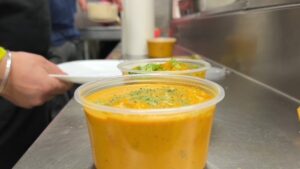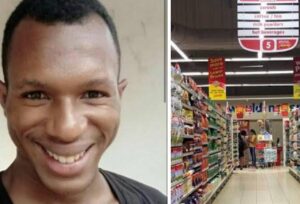Lonliness: Intergenerational cohabitation

Intergenerational cohabitation was popularized by American activist Maggie Kuhn, founder of the Gray Panthers (1970), who championed the rights of the elderly. This idea later spread to the UK and Spain around the 1980. These interventions appear theoretically promising and may function similarly to befriending interventions provided over longer periods of time, thus permitting for closer and more sustained relationships.
Despite 50 years of interest, high-quality evidence (systematic reviews, RCTs, longitudinal studies) regarding intergenerational living programmes, where younger and older people live together, and their potential effect on loneliness is missing. In Australia, there is qualitative evidence that intergenerational living was a positive experience and intergenerational relationships were meaningful (Gurung et al., 2022). The WeShareWeCare project in France, Belgium, Spain and the United Kingdom offered a feasibility review suggesting intergenerational programs could suit matching elderly and international students moving to study in a foreign country under a variety of practical arrangements (such as free or reduced fee home sharing among others). In Alicante, a municipal project for intergenerational housing and community service provided qualitative evidence for improvements in wellbeing, while maintaining independence and offering increased social contact.
At present, a promising next step for funders and researchers could be collaborating with charities (e.g. Share and Care Homeshare, Helpful Housemates, United for All Ages, Intergenerational Housing Network, see further in the Intergenerational Housing Blog) and relevant (current or potential) direct service providers, including relevant stakeholders at local governmental levels to establish an evidence base.
Notes on neglectedness
Funders
It is difficult to say who the biggest funders are in the field as funding seems distributed across a variety of sources with different levels of transparency and frequency of reporting.
A lot of funding seems to come from high-income countries including the UK, America, Canada, Australia, and some European countries and seems to primarily target within-country efforts, though there are global efforts as well. The UK seems to be the global leader in terms of funding.
International organizations such as the WHO and the UN have also been involved in this field but funding amounts and key priorities are unclear. The WHO’s team on Social Determinants of Health, particularly the unit for Demographic Change and Healthy Ageing has a focus on social isolation and loneliness. The most relevant branch within the UN appears to be the Department of Economic and Social Affairs (UNDESA) and their programme on ageing. WHO, DESA, ITU and UN Women have also launched an advocacy brief on social isolation and loneliness in older people (2021).
Some of the specific organizations that have been involved in funding and implementation programs to combat loneliness include:
- the AARP Foundation (USA)
- the National Institutes of Health (NIH) (USA)
- the Co-op Foundation (UK)
- and Age UK (UK)
- the British Red Cross (UK)
- the Campaign to End Loneliness (UK)
In 2018 the UK government announced a £20 million fund for projects tackling loneliness, of which £11.5 were provided from the Government, the Big Lottery, and the Co-op. The rest of the amount was provided by the Health Lottery and the Postcode Lottery. The annual Loneliness Engagement Fund will likely run again. It offers small grants between £15,000 and £50,000 to organizations who can engage with target groups at high risk of loneliness. Last year the fund spent £263,500.
NGOs
On NGO explorer, I find 57 NGOs under the filter for ‘loneliness’, linked to a total spend of £756.5 million in 103 countries. Some of the biggest (by income) NGOs are presented below. Not all of these tackle loneliness as a primary aim. Note these are NGOs based in the UK (even if operating abroad), so the catch area for NGO Explorer is limited and will exclude charities e.g. based in the States (for example, Men’s Shed in the US).
| Organization | Profile | Latest income | Intervention or services |
| Age UK | Makes grants
Work in Bangladesh, Colombia, Ethiopia, Haiti, India, Jordan, Kenya and others |
£127, 055, 000
(March 2021) |
“Age UK aims to create a world where older people can live their lives free from poverty, isolation and neglect. It raises awareness of issues affecting older people in the UK and overseas, researches and campaigns for changes in policy and practice, and offers practical support to disadvantaged older people. It is funded by individuals, companies and trusts. “ |
| The Children’s Cancer and Leukaemia Group | Makes grants
Work in Ireland |
£3, 890, 756 (December 2020) | “We fund and support innovative world-class research and collaborate, both nationally and internationally, to drive forward improvements in childhood cancer. Our award-winning information resources help lessen the anxiety, stress and loneliness commonly felt by families, giving support throughout the cancer journey.” |
| The Silver Line Helpline | Work in Guernsey, Isle of Man, and Jersey | £ 2, 599, 541 (March 2021) | “The Silver Line is a unique national service that provides three key functions to support older people:1. a signposting service to link them into the many and varied services that exist around the country;2. a friendship service to combat loneliness; and 3. a means of empowering those who may be suffering abuse and neglect and, if appropriate, transferring them to specialist services.” |
| My Israel | Makes grants
Work in Israel |
£575, 404
(December 2020) |
“Myisrael was founded in 2008 to support under-the-radar causes in Israel. Our causes cover mental health, special needs, poverty, homelessness, loneliness and education.” |
| Warm Hut UK | Work in England, Congo, France, Guinea, Côte d’Ivoire and | £275,577
(March 2021) |
“Our mission is that African people gain a better insight into their experiences of living abroad, have a positive attitude towards life in the UK, maximise their well-being, feel empowered and enabled to contribute to the host country.” |
| Linking Lives | Work in Guernsey | £116, 642
(March 2021) |
“Linking Lives UK is a national charity working to reduce lonelinessand social isolation amongst older people. We achieve this through the development of befriending schemes and social events and activities which are set up in partnership with local churches and other agencies. “ |
Conclusions
Summary of key points
- While loneliness is linked to a huge health and economic burden, more needs to be done to find robustly effective and cost-effective interventions.
- Evidence from meta-analyses shows there are different available interventions that can be effective to decrease the burden of loneliness. This is constrained by poor population targeting and short follow-up times.
- At the same time, not all loneliness interventions are effective. From the interventions this report found that are effective, only some are cost-saving, and fewer still are cost-effective from a public policy or government perspective (e.g. NHS: £20,000 – £30,000 per QALY gained).
- Understanding what works and which interventions types are most promising is not straightforward given methodological concerns and pronounced heterogeneity in population samples.
- Some key concerns include:
- Many interventions do not specifically target lonely people.
- Lack of longitudinal data.
- Difficulty to parse out causal mechanisms.
- Few are carried out in LMICs and we know little about the burden or loneliness there.
- Some theoretically promising interventions, like intergenerational living programs, are not robustly empirically evaluated.
Like Our Story ? Donate to Support Us, Click Here
You want to share a story with us? Do you want to advertise with us? Do you need publicity/live coverage for product, service, or event? Contact us on WhatsApp +16477721660 or email Adebaconnector@gmail.com








